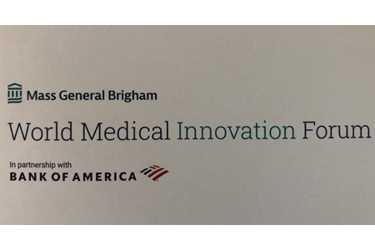Mass General Brigham's 2022 World Medical Innovation Forum

By Erin Harris, Editor-In-Chief, Cell & Gene
Follow Me On Twitter @ErinHarris_1

Mass General Brigham’s 2022 World Medical Innovation Forum, in partnership with Bank of America, was held May 2-4 in Boston, and just as in previous years, this year’s event was chock full of valuable, innovative content. From the main stage panel discussions to “The Dr. Is In” lunch-and-learn-style sessions, luminaries from academia and industry shared valuable and innovative data on the future of cell and gene therapies from the future of CRISPR to safe and efficacious treatment of solid tumors to life-saving therapies for rare diseases.
Each and every main stage session delivered value. And I can’t say enough good things about “The Dr. Is In” sessions; it was difficult to decide which hyper-specific session to attend, because the description for each one sparked my interest. Also, I had the opportunity to share the main stage with David Scadden, M.D., Director, Center for Regenerative Medicine, MGH Gerald and Darlene Jordan Professor of Medicine, HMS and Ned Sharpless, M.D., Former Director, National Cancer Institute to discuss the merits of personalized therapies, or individualized therapies as they are now called per Dr. Peter Marks, versus off-the-shelf therapies as a way to “end cancer as we know it.” More on that discussion in another article.
An Understaffed CBER to Embrace Remote Work
Center for Biologics Evaluation and Research (CBER)’s Dr. Peter Marks joined the conference remotely, and during his main stage session, he discussed the FDA’s need to overcome its current staffing issue in order to help more sponsor companies in a timely manner. “I think right now obviously the workload that came during the pandemic for our cell and gene therapy branches were very, very significant,” Dr. Marks explained. “That workload was so significant because submissions continued to come in, and then we had a bolus of submissions in the cell-based therapy and for therapies related to COVID-19. There were other therapeutics related to COVID-19 that fell into our side of the biologics house, and that kept people very busy. We were probably 50% understaffed going into the pandemic, and we remain very understaffed from my perspective.”
Dr. Marks states that over the past two years, the agency has learned that remote work can be accomplished if highly motivated, highly qualified people are hired. As such, skilled workers will be hired from all over the United States to overcome the talent shortage. “This should hopefully help us to step up more quickly than we would have otherwise. The bottom line for sponsors is that their interaction with the agency is important.”
The Dr. Is In
I attended Dr. Natalie Artzi, Ph.D, Assistant Professor of Medicine, HMS, The Dr.Is In session, Smart Materials: Non-Viral Vectors for Gene Therapy. In short, Dr. Artzi explained that long-run delivery systems are very promising, as they can deliver the range of cargoes using different types of nanoparticles, as a large amount of trial materials exist and can be used for delivery depending on the cargo and the target site. She explained that because many new organizations are entering clinical trials, future iterations must focus on designing safer and more potent therapeutics for a range of diseases. Evidenced by COVID-19 vaccines for modern biotech, non-viral delivery systems when combined with the right therapy, can change the face of a global pandemic. “We believe that with the right delivery vehicles and choice of nucleic acid, we can have the same transformative outcomes in terms of the treatment and prevention of many other types of diseases,” she concluded.
Patient Advocacy as the Bedrock of CGT
Finally, I would argue that one of if not the most compelling sessions was the main stage panel discussion featuring leaders from various patient advocacy groups. MGH’s Dr. Merit Cudkowicz moderated, and Solid Biosciences’ Annie Ganot, University of Pennsylvania’s Dr. Staci Kallish, The M4 Foundation’s Rebecca Oberman, Ph.D., and Monica Coenraads, CEO at Rett Syndrome Research Trust discussed the crucial role patients play in every stage of therapy development. Annie and Monica shared how their children live with rare diseases, Duchenne Muscular Dystrophy (DMD) and Rett Syndrome respectively, and how advocacy groups have improved their children’s lives. The panelists shared the importance of holding focus groups based on disease-specific care and for families to surround themselves with people who can help them ask the right questions of their practitioners, healthcare systems, etc. But here’s what struck me most about this panel. The humanity and the grace and the unrelenting perseverance with which the group members work for their children and for all the people affected by disease is as inspirational as it is humbling. I’m not ashamed to say I had to fight back tears as Monica candidly shared how she worries every single day about who will care for her daughter, who needs around-the-clock, comprehensive care, after she’s gone. I’m choked up now just writing the recap – their message was that impactful.
The patient advocacy panel was a resounding confirmation of the important work everyone at 2022 WMIF and the CGT sector at large does every day for patients. I have more to say on the event, which I’ll share in a forthcoming article. But for now, suffice it to say that I’m already looking forward to next year’s conference to learn what innovations in CGT have been realized.
